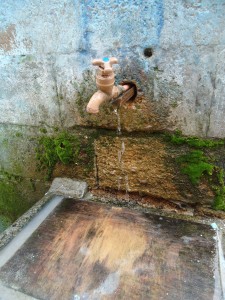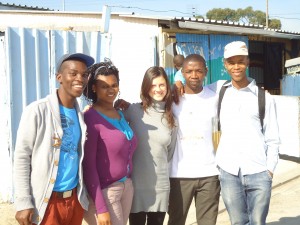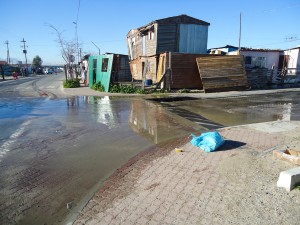As part of my Masters program, I (just) completed a 2 and a half-month field season in Cape Town, South Africa from mid-May to the end of July 2012. I arrived on May 12th and met with the Anthropology of Water research group (AOW) a few days later. AOW is a working group at the University of Western Cape (UWC), led by the Professor Jacqueline Goldin and consisting of graduate students from a variety of backgrounds. Dr. Goldin and the group were extremely helpful in directing my work with guidance and logistical assistance as well as with making me feel very welcome and comfortable in Cape Town.
My work took place in Site C in Khayelitsha – a partially informal area of the Khayelitsha township, created by the City in the 1980s for displaced populations from Crossroads. I worked with a team of very enthusiastic young people from Khayelitsha and two students from UWC. In terms of water services, site C is a transitional site, where informal communal taps are being gradually replaced with private in-house water connections as part of the upgrading of the area. I had 4 focus groups with residents and 32 interviews with residents and community leaders in site C, investigating their lived experiences with water services as well as with participation in formal and informal governance mechanisms and spaces.
Through my work, I met with a number of NGOs and other organizations, active in the water services sector in the informal settlements, including the Environmental Monitoring Group (EMG) and the Western Cape Water Caucus. Issues with water services vary significantly across different township areas. They include, but are not limited to, inadequate quality of water services for residents of informal “shacks”, extremely large water bills, controversial installation of water demand management devices and water meters, anxious anticipation of payment for water in transition sites (i.e. Site C), inadequate sanitation services, disillusionment with government, and others. A number of service delivery protests took place during my visit, some in Khayelitsha and Philippi (also a township in Cape Town), involving burning of porter potties and tires and damaging traffic posts. Local newspapers claim that 2012 is experiencing a record number of service delivery protests in South Africa in the past decade, highlighting the importance of protests as a form of informal engagement in governance.
Overall, I had a very rich fieldwork experience in one of the most beautiful and most unequal cities in the world…
– Lucy Rodina, Aug 3, 2012, Cape Town, South Africa
Acknowledgements: In addition to Prof. Goldin and AOW, I would like to acknowledge the invaluable help of Kim Smith, student in UWC and a member of the Access Water 2012 Polar expedition, and Vivian Zilo, founder of Iliso Care Society, based in Khayelitsha, Cape Town.


